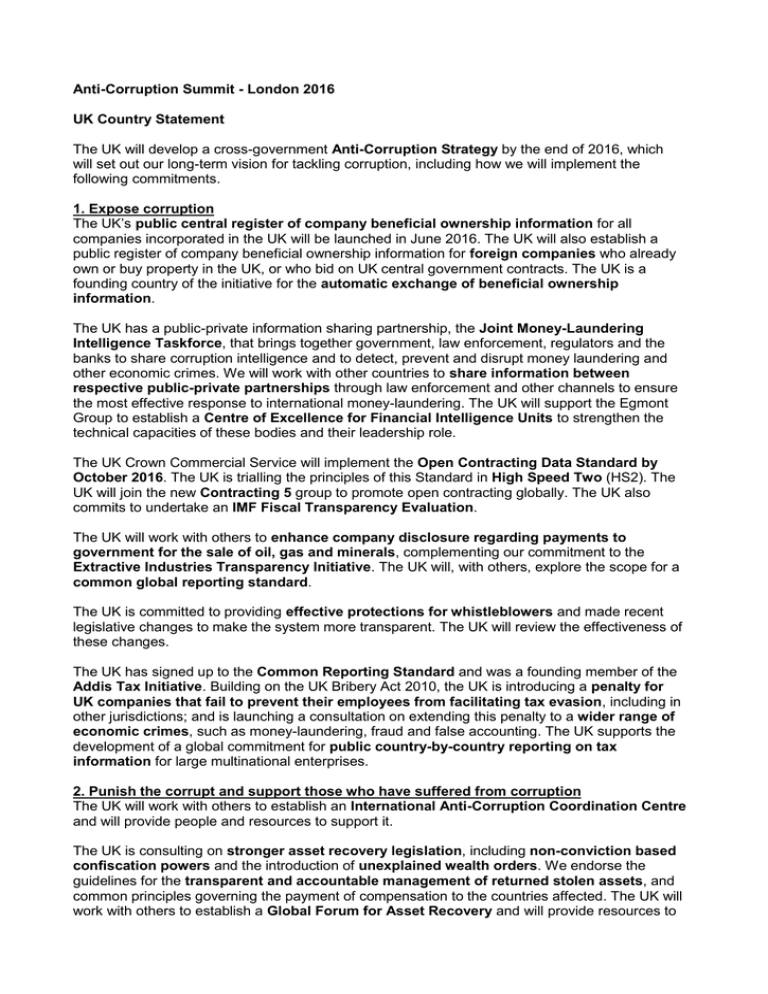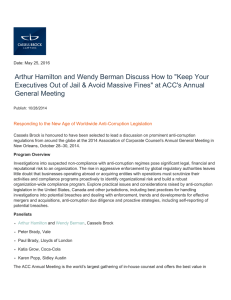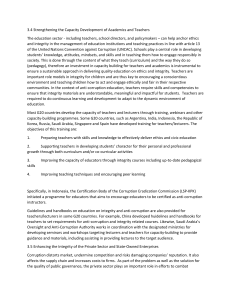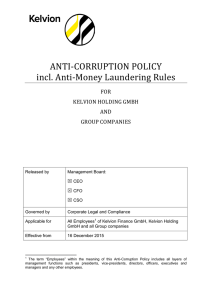Anti-Corruption Summit
advertisement

Anti-Corruption Summit - London 2016 UK Country Statement The UK will develop a cross-government Anti-Corruption Strategy by the end of 2016, which will set out our long-term vision for tackling corruption, including how we will implement the following commitments. 1. Expose corruption The UK’s public central register of company beneficial ownership information for all companies incorporated in the UK will be launched in June 2016. The UK will also establish a public register of company beneficial ownership information for foreign companies who already own or buy property in the UK, or who bid on UK central government contracts. The UK is a founding country of the initiative for the automatic exchange of beneficial ownership information. The UK has a public-private information sharing partnership, the Joint Money-Laundering Intelligence Taskforce, that brings together government, law enforcement, regulators and the banks to share corruption intelligence and to detect, prevent and disrupt money laundering and other economic crimes. We will work with other countries to share information between respective public-private partnerships through law enforcement and other channels to ensure the most effective response to international money-laundering. The UK will support the Egmont Group to establish a Centre of Excellence for Financial Intelligence Units to strengthen the technical capacities of these bodies and their leadership role. The UK Crown Commercial Service will implement the Open Contracting Data Standard by October 2016. The UK is trialling the principles of this Standard in High Speed Two (HS2). The UK will join the new Contracting 5 group to promote open contracting globally. The UK also commits to undertake an IMF Fiscal Transparency Evaluation. The UK will work with others to enhance company disclosure regarding payments to government for the sale of oil, gas and minerals, complementing our commitment to the Extractive Industries Transparency Initiative. The UK will, with others, explore the scope for a common global reporting standard. The UK is committed to providing effective protections for whistleblowers and made recent legislative changes to make the system more transparent. The UK will review the effectiveness of these changes. The UK has signed up to the Common Reporting Standard and was a founding member of the Addis Tax Initiative. Building on the UK Bribery Act 2010, the UK is introducing a penalty for UK companies that fail to prevent their employees from facilitating tax evasion, including in other jurisdictions; and is launching a consultation on extending this penalty to a wider range of economic crimes, such as money-laundering, fraud and false accounting. The UK supports the development of a global commitment for public country-by-country reporting on tax information for large multinational enterprises. 2. Punish the corrupt and support those who have suffered from corruption The UK will work with others to establish an International Anti-Corruption Coordination Centre and will provide people and resources to support it. The UK is consulting on stronger asset recovery legislation, including non-conviction based confiscation powers and the introduction of unexplained wealth orders. We endorse the guidelines for the transparent and accountable management of returned stolen assets, and common principles governing the payment of compensation to the countries affected. The UK will work with others to establish a Global Forum for Asset Recovery and will provide resources to support it. We will co-host the inaugural meeting of the Global Forum with the United States of America in 2017, focusing on Nigeria, Ukraine, Tunisia and Sri Lanka. The UK will introduce a conviction check process to prevent corrupt bidders with relevant convictions from winning public contracts, and is committed to exploring ways of sharing such information across borders. 3. Drive out the culture of corruption, wherever it exists The UK will continue to work with international sports bodies, other countries and international organisations to develop an International Sport Integrity Partnership. The UK is also launching a domestic charter on integrity and good governance in sport. The UK was one of only two countries to receive an A rating in the 2015 Transparency International Government Defence Anti-Corruption Index. We will ensure that our assistance to foreign security and defence sectors supports good governance, to reduce the risk of corruption in the security sector. The UK will launch practitioner partnerships on institutional integrity with Nigeria, Tanzania, Kenya, Afghanistan and Georgia to share expertise in the areas of audit, financial regulation, anticorruption, and parliamentary budget oversight. The UK will support a learning exchange for the Institutional Integrity Network at the OECD. The UK is launching an Anti-Corruption Innovation Hub with other countries to support social innovators, technology experts, and data scientists to collaborate with law enforcement and civil society organisations on innovative approaches to anti-corruption. The UK will work with other countries, civil society, and international organisations to accelerate the implementation of the voluntary provisions of the UN Convention Against Corruption. The UK will support the establishment of an OECD anti-corruption and integrity platform to strengthen the impact and coherence of existing OECD anti-corruption work.






